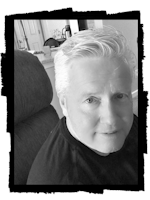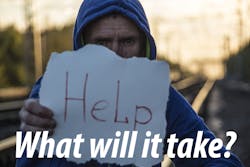“When people kill themselves, they think they’re ending the pain, but all they’re doing is passing it on to those they leave behind.” Jeannette Walls
“My husband, David Colegrove, was a law enforcement officer for 30 years. He killed himself in 2014, less than three months after he retired,” said Kim Colegrove. “Since his suicide, I’ve learned a lot about trauma, post-traumatic stress, secondary trauma, hypervigilance, and the common predictors of suicide among law enforcement professionals and other first responders.” Kim’s tragic loss compelled her to create The Pause First Project, dedicated to bringing mindfulness practices to first responders.
As of this writing, February 2019, law enforcement has already lost 33 officers to suicides. That’s an astounding number, particularly when compared with total line of duty deaths thus far—17. Why the disparity, why are we killing ourselves in such high numbers? Much of the reason stems from what cops see every day. Horrible things, man’s inhumanity to others. Beatings, shootings, murders, they all cause indelible memories that can haunt many officers for the rest of their lives. The resulting trauma affects not only the victims of crime, but also the witnesses and those who investigate the incidents.
Trauma
Kim advised that, “Trauma happens when someone experiences or witnesses abuse, victimization, neglect, loss, violence and disasters. Unfortunately, the majority of first responders experience some kind of trauma during their career and it can be toxic to them mentally and emotionally.
“In my husband’s first year of policing, when he was only 21 years old, he was involved in a shooting and someone died. He was called into the police station, where his badge and gun were taken away and he was sent home. For days he did not know what was going to happen. Then he got a call telling him he had been cleared and should report to roll call the next day. And that was that. Back to work. No counseling, no conversation, and no support of any kind.”
Like many of us, Kim’s husband tried to shrug off his trauma using alcohol and developing a counter-personality of someone who was angry and paranoid. His suffering affected his marriage and family and left him helpless to deal with simple changes in life. As his retirement date drew closer, he became more anxious and eventually wound up being hospitalized. Prescribed medication for his anxiety only exacerbated things and resulted in David’s suicide shortly thereafter.
PTSD
Bob Angone, a retired Chicago police lieutenant who led the SWAT team, reported that Chicago cops are even more at risk for suicide. Studies indicate the number of police suicides in the nation are more than triple that of officers fatally shot. In Chicago where there is a chronic gun problem, the violence and murders mean cops witness unbelievable trauma on a regular basis. The result? A DOJ report indicated a suicide rate among Chicago officers 60 percent higher than the national average. That number may even be higher since it does not include retired cops who take their own lives. Alexa James, Director of the National Alliance on Mental Illness, likens Chicago to a war zone. She said LE is one of the most toxic, caustic career fields in the world. Sadly, while the military readily acknowledges the prevalence of PTSD and its impact, the field of police work has not caught on fully to the perils of the disorder.
What to look for
According to Kim, those having thoughts about suicide share many of the same symptoms. They may manifest themselves in multiple ways or in a single symptom. Regardless, if you or someone you may know exhibits any of the following symptoms, please seek help at once.
- Chronic Stress
- Depression
- Anxiety
- Anger
- Intense Irritability
- Aggression
- Alcohol Abuse/Alcoholism
- Drug Use/Addiction
- Hopelessness
- Isolation/Withdrawal
- Suicide Ideation
- Talk of Suicide
Kim said there are many contributing factors, including childhood trauma of any type that causes officers to get into a helping profession such as police work. So why don’t cops seek help? Many reasons, not the least of which is worrying that co-workers and bosses may find out they are seeing a counselor or therapist. The macho persona doesn’t want to appear weak or needy. And what might happen to their performance rating if the supervisor thinks they have a mental health problem? Will my partner still want to work with me? Will I be a weak link? Will I be put on desk duty?
The irony
A sheriff’s deputy in Florida related the following: “The funny thing about being a cop is that your trust levels almost completely disappear. Whenever someone’s telling you something, you automatically assume that they’re full of it. Whether it’s true or not, that’s how you’re approaching almost everything. A lot of cops feel that mental health help is almost like a trap. They’re afraid of anyone finding out, afraid of it being used against them, and they’d rather just suck it up in their own way and deal with the consequences.”
This train of thought usually leads to alcohol or drug abuse which is just a band-aid approach. Moreover, this self-medication can lead to errors of judgment, excessive use of force, and an inability to deal with emotions. The officer becomes a powder keg likely to explode at any moment.
The good news is that many officers suffering from traumatic incidents may only need support rather than professional help. Many departments have created peer support groups that don’t breed a culture that stigmatizes anyone seeking help. There are also ways to remain anonymous so that the department won’t know you’re seeking help. If you are suffering from depression, you can contact the National Alliance on Mental Illness helpline at 1-800-950-6264. And if you are having thoughts about hurting yourself, immediately contact the National Suicide Prevention Lifeline at 1-800-273-8255. Most of all please talk with someone. Don’t bottle it all up and think it will go away—it won’t—it will only get worse. You’re not alone, there is help waiting for you all you. All you need do is ask.
Stay Safe, Brothers and Sisters!

John Wills
John M. Wills is a former Chicago police officer and retired FBI agent. He is a freelance writer and award-winning author in a variety of genres, including novels, short stories and poetry. John also writes book reviews for the New York Journal of Books, and is a member of the National Book Critics Circle. His new book, The Year Without Christmas, is available now. Visit John at: www.johnmwills.com.



